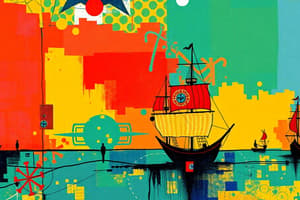Podcast
Questions and Answers
What time period is referred to as the Age of Exploration?
What time period is referred to as the Age of Exploration?
- 250s to 300s
- 1400s to 1500s (correct)
- 1600s to 1700s
- 1800s to 1900s
What is an astrolabe?
What is an astrolabe?
A navigational tool that allows calculation of location based on celestial bodies.
What type of ship was a caravel?
What type of ship was a caravel?
A light, fast sailing ship.
Who was Henry the Navigator?
Who was Henry the Navigator?
What was Christopher Columbus trying to find?
What was Christopher Columbus trying to find?
What does it mean to circumnavigate?
What does it mean to circumnavigate?
Match the following explorers with their achievements:
Match the following explorers with their achievements:
The Treaty of Tordesillas drew an imaginary line through the _____.
The Treaty of Tordesillas drew an imaginary line through the _____.
What is the Columbian Exchange?
What is the Columbian Exchange?
What was the main purpose of the triangular trade?
What was the main purpose of the triangular trade?
What is mercantilism?
What is mercantilism?
Flashcards are hidden until you start studying
Study Notes
Age of Exploration
- Time period in the late 1400s to 1500s marked by European voyages to discover new lands and routes.
Astrolabe
- Technological advancement learned from Muslims that enabled navigators to pinpoint their location using solar and stellar positions.
Caravel
- A fast, lightweight ship equipped with a rudder for steering and lateen sails that allowed efficient sailing against the wind.
Henry the Navigator
- Portuguese prince who sponsored explorations but did not sail himself; aimed to find a water route around Africa to India but died before achieving this.
Christopher Columbus
- Italian explorer sponsored by Spain who mistakenly reached the Americas while attempting to find a westward route to China; made four voyages in total.
Ferdinand Magellan
- Portuguese explorer sailing for Spain who led the first circumnavigation of the globe, starting in 1519; died during the voyage in the Philippines.
Circumnavigate
- The act of sailing entirely around the world; first successfully completed by Magellan's crew.
Conquistadors
- Spanish military leaders who conquered native populations in the Americas, notably during the period of exploration.
Hernan Cortez
- Spanish conquistador who led the expedition that resulted in the fall of the Aztec Empire, aided by alliances with disaffected native groups and superior weaponry.
Francisco Pizarro
- Conquistador who conquered the weakened Inca Empire in Peru about a decade after Cortez's conquest of the Aztecs.
Treaty of Tordesillas
- Signed in 1494, this treaty divided newly discovered lands between Spain and Portugal, assigning most of the Americas to Spain and Brazil to Portugal.
Columbian Exchange
- The extensive exchange of flora, fauna, and diseases between Native Americans and Europeans, greatly influencing both societies.
Slave Trade
- Emerged from labor shortages in the Americas leading to millions of Africans being enslaved and transported through the Atlantic; primarily sourced from West Africa.
Mercantilism
- Economic theory dominant from the 1500s to the 1700s positing that a nation's strength is directly linked to its wealth and accumulation of resources.
Triangular Trade
- A trade system involving three regions; significantly included the shipment of enslaved Africans to the Americas, goods to Europe, and resources back to Africa.
Studying That Suits You
Use AI to generate personalized quizzes and flashcards to suit your learning preferences.




